Off Key: Great Hindi Film Musicals That Flopped
Subscribe to read full article
This section is for paid subscribers only. Our subscription is only $37/- for one full year.
You get unlimited access to all paid section and features on the website with this subscription.
Not ready for a full subscription?
You can access this article for $2, and have it saved to your account for one year.
Hindi film songs have often propped up creaky narratives and catapulted incoherent clangers to box-office glory. Yet, there have been instances where a brilliant score could not save a film from being a commercial disaster. Shantanu Ray Chaudhuri looks at some of the most defining of such failures…
Little did Wazir Mohammed Khan realize that when he sang the lines De de khuda ke naam par in Alam Ara (1931) he would unleash a tradition that would define popular Indian cinema. Film songs have been an integral part of our lives, giving Indian cinema an identity of its own, distinct from all other cinemas of the world.
Though it’s possible to argue about the negative consequences of the ubiquitous nature of the song in popular Indian cinema – how it has stymied the development of certain genres like the whodunit, the thriller, the biography – that’s a discussion for another place. Most importantly, film songs have held together creaky narratives and catapulted to box-office glory clangers that would otherwise have been unwatchable. In Hindi cinema itself, there are too many of these to even start listing – anodyne stars like Joy Mukherjee, Rajendra Kumar and Rahul Roy, who became box-office heartthrobs thanks to the songs they lip-synced to, films like Hum Aapke Hai Koun and Saajan which would have been an onslaught on our senses but for their songs. Imagine what a film like An Evening in Paris, or for that matter any of the hill-station romances of the 1960s, would be without the songs! As noted film scholar and critic Chidananda Das Gupta said, ‘Hindi cinema would not have had its all-India acceptability without songs.’ One might add: it would not have its international acceptability without songs.
Mera Naam Joker (1970)
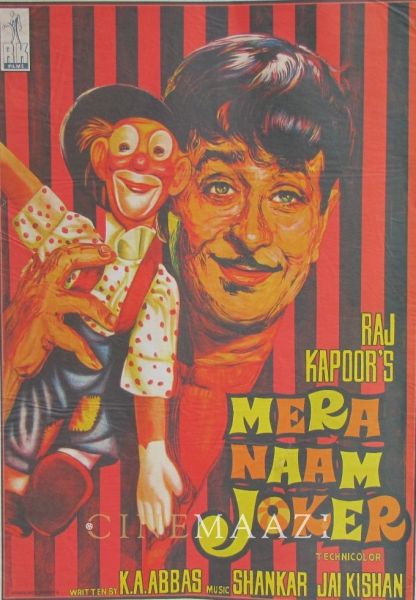
A family friend of the director, J.P. Chowksey, kept insisting with him to cut the film down to three hours. Though Raj Kapoor was initially reluctant (‘Beti ghar se vidaa ho gayi, ab kya…’ was his reaction), he gave in and a three-hour version was finally released, with all the cuts pertaining to the second and third parts. Satyajit Ray had in fact suggested to Raj Kapoor that he release only the first part (starring Simi Garewal and Rishi Kapoor) as an independent film, saying that with its lyrical storytelling, it would go down as one of greatest films in the world. The trimmed version went on to do better and the film has become one of RK Films’ biggest home video successes, but it was for the longest time the benchmark of flops.
And Raj Kapoor would never again act in a film he made.
Prem Pujari (1970)
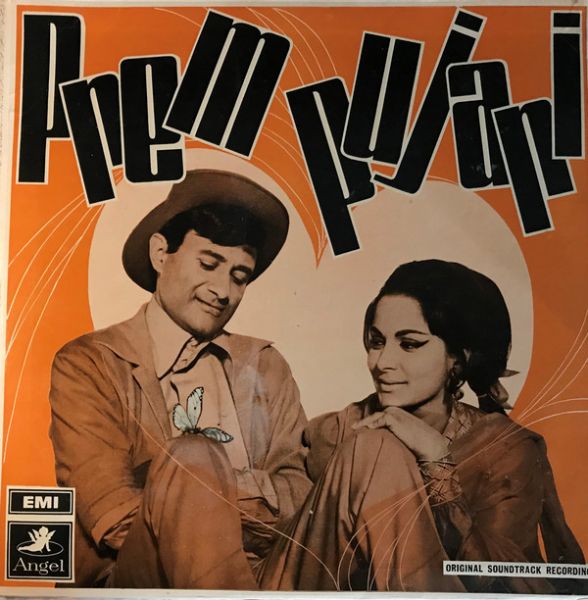
One of the hardest hit with the film’s failure would be lyricist Neeraj (Gambler, which followed soon after would meet a similar fate – great songs in a miserable commercial failure). In an industry steeped in superstition, he would soon come to be referred to as the ‘jinxed’ lyricist who could be counted upon to deliver the finest of songs if only you were willing to risk a flop.
Unlike Raj Kapoor, Dev Anand would continue to cast himself in his own films right till the end, but Prem Pujari was the first chink in the evergreen hero’s stardom. It’s only its music that has endured.
Mere Jeevan Saathi (1972)
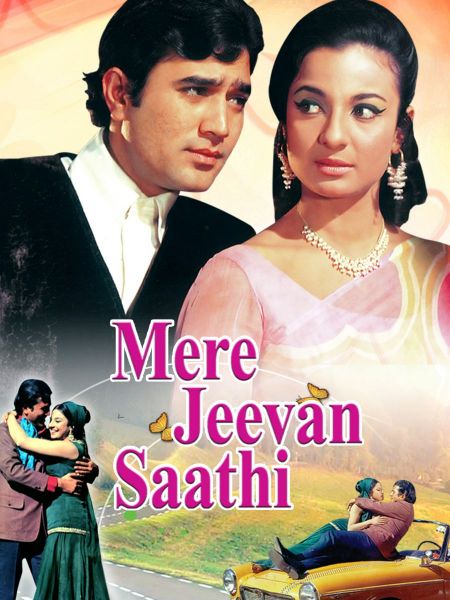
Yet, the film bombed – and how! As Yasser Usman, author of a bestselling book on the star (Rajesh Khanna: The Untold Story of India’s First Superstar), says, ‘To look at Mere Jeevan Saathi in isolation may not explain its failure. There are many problems with what’s happening in the story but he looked smashing, there is superb music and his stardom should have been enough. But people had moved on. It exposed the chinks in Khanna's armour. His decline definitely began in 1972. Dil Daulat Duniya, Shehzada, Joru Ka Ghulam, Maalik and Mere Jeevan Sathi. Five flops. It’s similar to what happened to SRK with Happy New Year/ Jab Harry Met Sejal/Dilwale/Fan. A few other Khanna films that released that year were mostly signed before his superstardom. But this one was completely packaged according to his new image. He took the failure really badly. Also, there were too many Khanna films per year and fans were asking for something more from his performances.’
The story would be repeated with films like Ajanabee and Anurodh – great music that failed to salvage the films. But nothing beats Mere Jeevan Saathi for the impact its failure had, despite a musical score that has become a cult. If there is a film that clearly demarcates that the Khanna phase was coming to a close, it was Mere Jeevan Saathi.
Ishk Ishk Ishk (1974)
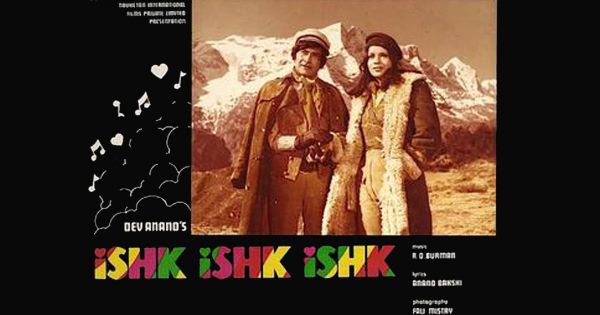
That the star-director could make a hash of a brilliant score was all too obvious with Ishk Ishk Ishk. He picked some great locations, trekking and sleeping in tents before zeroing in on Shyangboche, he had an enviable young cast (Shabana Azmi, Zarina Wahab, Shekhar Kapur and Padmini Kolhapure, with the redoubtable Premnath and Nadira), and he had one of finest musical scores of the decade, one that was as experimental as it was spirited. Yet, poor picturization undid all of Pancham’s efforts while Dev Anand’s limitations as a director were palpable in the poor performances, the shoddy screenplay and almost every other aspect of the film. The film sank and with it the music too got buried only to be rediscovered over the decades by Pancham’s devoted following.
Silsila (1981)
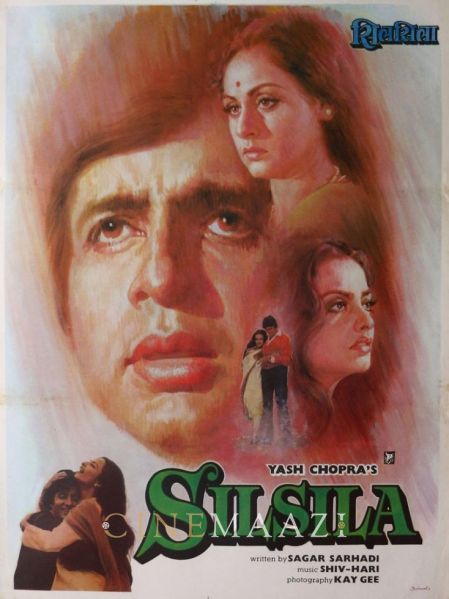
The casting hype, however, proved too much for the film to sustain. A schmaltzy screenplay, moony romance that seemed out of sync with the changing times, coupled with a cop-out of a climax devoid of all honesty put paid to whatever chances it had at the box office. Not even three top-notch performances and a brilliant turn by Sanjeev Kumar could save the film. Forty years later, what remains is a nagging regret about what the film might have been had the people making it had the courage of conviction to follow up on the casting. And of course, the music, the music. Tulips have never seemed as glorious, Dekha ek khwab is still capable of exciting a million romantic dreams, Lata Mangeshkar would seldom again scale the highs of Neela asmaan and Rang barse remains the default Holi song even today.
Teri Kasam and Star (1982)
.jpg/star%20(1)__446x600.jpg)
In 1981, a film without a directorial credit created a star overnight. Rahul Rawail made Love Story with debutant Kumar Gaurav but refused to take credit as director following creative differences with the film’s producer. Riding on R.D. Burman’s wildly popular music, and backed by a dew-fresh retelling of the hoary Hindi film teenybopper-romance-in-the-face-of-parental-opposition, the film became one of the biggest hits of the year, generating the kind of craze for Kumar Gaurav that no debutant since – not Shah Rukh, not Aamir, not Salman – has managed. With the 1970s heroes getting into the autumn of their careers, Kumar Gaurav was anointed the next superstar. I was a gawky teenager at the time and was witness to the hysteria the star generated.
What whipped up frenzy for the star were the advance reports on the music of his next two ventures, one scored by R.D. Burman again, the other by Biddu, the nation’s blue-eyed composer at the time in the wake of Qurbani’s Aap jaisa koi and the private album Disco Deewane.
Teri Kasam and Star came riding on the wave of Love Story, both had great music and both bit the dust at the box-office. Written and produced by Biddu, Star was directed by Vinod Pande (of Ek Baar Phir and Yeh Nazdeekiyan fame) and had Hindi cinema’s most authentic disco score (not even Disco Dancer measures up to the sound of Star) composed by Biddu and sung by Nazia and Zoheb Hassan (who were Biddu’s first choice for the film’s leads). Though no one has cracked the mystery of the box office, what might have worked against both films was that they were not your run-of-the-mill fluffy romances. In Teri Kasam, the lead characters marry each other early on in the narrative and then separate, while in Star, the hero loses his girl to his brother (a taboo at the time as far as Hindi cinema was concerned).
Audiences excepting another cute Love Story-style boy-meets-girl outing were disappointed and not even the superlative music (much better than Love Story’s) could salvage the films. Kumar Gaurav’s career never recovered from the double whammy.
Tags
About the Author
Shantanu Ray Chaudhuri is either an 'accidental' editor who strayed into publishing from a career in finance and accounts or an 'accidental' finance person who found his calling in publishing. He studied commerce and after about a decade in finance and accounts, he left it for good. He did a course in film, television and journalism from the Xavier's Institute of Mass Communication, Mumbai, after which he launched a film magazine of his own called Lights Camera Action. As executive editor at HarperCollins Publishers India, he helped launch what came to be regarded as the go-to cinema, music and culture list in Indian publishing. Books commissioned and edited by him have won the National Award for Best Book on Cinema and the MAMI (Mumbai Academy of Moving Images) Award for Best Writing on Cinema. He also commissioned and edited some of India's leading authors like Gulzar, Manu Joseph, Kiran Nagarkar, Arun Shourie and worked out co-pub arrangements with the Society for the Preservation of Satyajit Ray Archives, apart from publishing a number of first-time authors in cinema whose books went on to become best-sellers. In 2017, he was named Editor of the Year by the apex publishing body, Publishing Next. He has been a regular contributor to Anupama Chopra's online magazine Film Companion. He is also a published author, with two books to his credit: Whims – A Book of Poems (published by Writers Workshop) and Icons from Bollywood (published by Penguin Books).



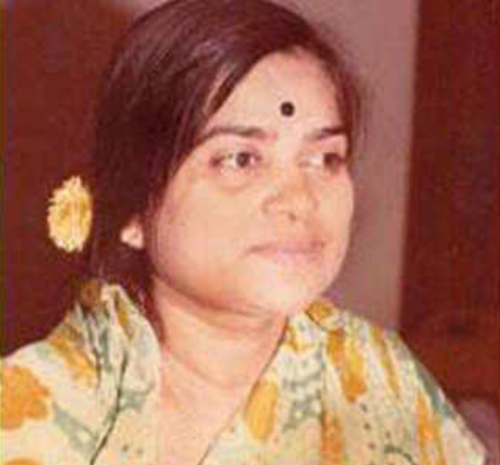
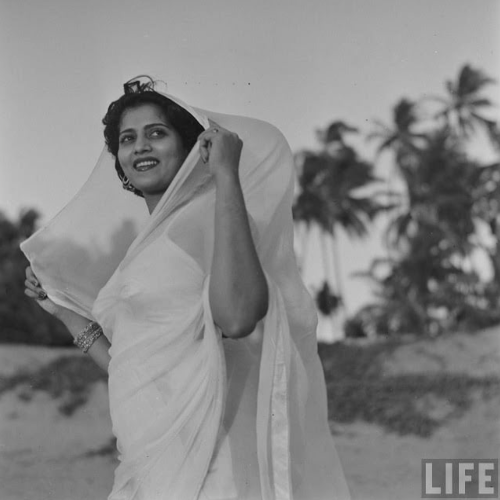



.jpg)



